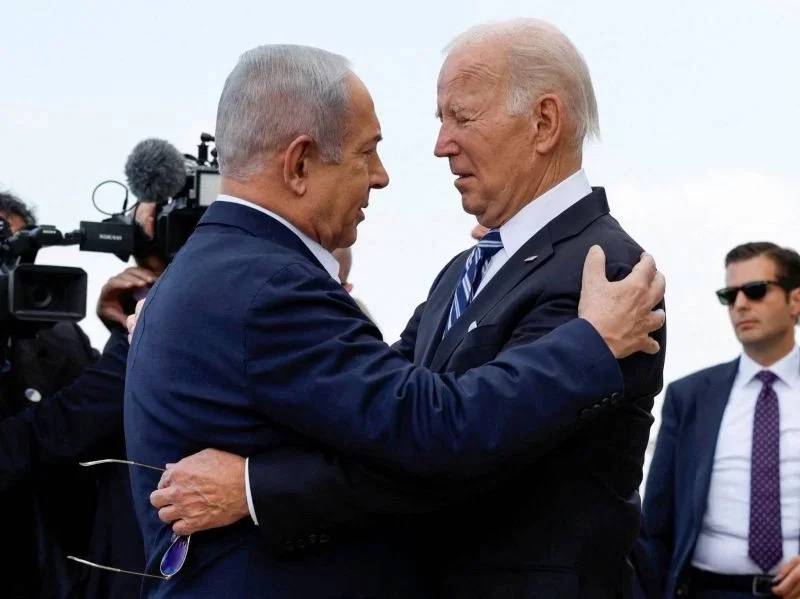
American President Joe Biden welcomed by Israeli Prime Minister Benjamin Netanyahu in Tel Aviv amid the war on Gaza, on Oct. 18, 2023. (Credit: Evelyn Hockstein/Reuters)
Publicly, US’s backing of Israel seems firm: Joe Biden’s visit in the midst of war, a promise of over $14 billion in aid and daily coordination with Israeli Prime Minister Benjamin Netanyahu. But behind the scenes, there are discreet pressures at play.
In recent days, Washington exerted its full weight on Israel to prevent the opening of a northern front against Hezbollah, and to avoid a regional escalation of the situation in Gaza. According to The New York Times (NYT), the Biden administration advised Israel to postpone its ground offensive to negotiate the release of hostages and allow humanitarian aid to enter the besieged enclave. Israel's planned military operation has already been postponed several times, although it was a red line intended to provoke a strong reaction from the Iranians and their regional affiliates. In NYT op-ed, Thomas Friedman, a close associate of the American president, wrote on Oct. 19: “Biden, I know, tried really hard to get Israeli leaders to pause in their rage and think three steps ahead — not only about how to get into Gaza to take down Hamas but also about how to get out — and how to do it with the fewest civilian casualties possible.”
Preventing Escalation
The American newspaper adds that, in the face of potential attacks from pro-Iranian groups, Washington wishes for more time to prepare. Drone and missile strikes have increased in recent days against military bases housing American soldiers in the Middle East. Exchanges of fire at the Lebanese-Israeli border have intensified over the weekend. The threat of regionalizing the conflict is something the Americans are trying to ward off, notably through the deployment of a vast arsenal of deterrence. The world's largest aircraft carrier is already stationed off the coast of Israel; another is expected to arrive soon, and thousands of soldiers have been placed on pre-deployment status. Secretary of Defense Lloyd Austin warned on Sunday any “organization” or “country” tempted to “expand” the conflict, stating that the United States would not hesitate “to take action” if its interests were targeted.
The American military official, in regular contact with Tel Aviv regarding its military operations, reportedly discussed with Israeli counterparts "alternatives" to a ground offensive, as specified by Joe Biden to journalists after his return from Israel. While Washington does not outright oppose a ground offensive, and supports Israel's desire to eradicate Hamas, it seeks to contain its negative effects. Biden told Tel Aviv’s government to respect international law and not occupy the Gaza Strip.
In addition to potentially causing a regional escalation, a ground operation carries numerous tactical and strategic risks, not to mention the threat it poses to the lives of the 220 hostages held by Hamas and Islamic Jihad in the Gaza Strip, including Americans. Close to the United States and on good terms with the Islamist group, Qatar secured the release of two American hostages last Friday, suggesting that a window of opportunity for further discussions was open. Doha indicated on Sunday that other abducted individuals could be released "very soon," with NYT mentioning talks involving nearly 50 dual nationals.
Faced with an Israeli government that turned a deaf ear to their concerns about a ground offensive, the loved ones of the hostages directly approached Western embassies. With the US election, in which Joe Biden is running for reelection, nearly a year away, the safety of Americans worldwide is particularly important to him. Especially since the war overshadowed the result of several months of negotiations that led to a prisoner exchange with Iran in September.
Besides the release of the hostages, the US hopes to facilitate the passage of its citizens stranded in Gaza to Egypt, as the Rafah border crossing was only reopened on Saturday to allow essential humanitarian aid into Gaza.
Humanitarian aspect
Given the complete blockade imposed on the territory, lacking fuel, electricity, water and supplies, the United States insisted that Israel make humanitarian concessions. Israel, on the other hand, made the release of hostages a condition for allowing the passage of aid, which finally began on Saturday, a few hours after two American hostages were released.
Biden and Benjamin Netanyahu agreed on Sunday for the "continuous" entry of aid trucks into Gaza. This move aims to consolidate a front of support for Tel Aviv while perhaps calming concerns of their Arab partners. During his brief visit last Wednesday, Biden warned Netanyahu not to be consumed by "rage" and to avoid the "mistakes" made by the US after Sept. 11.
On his X (formerly Twitter) account, he posted on Sunday his commitment to a two-state solution. "If Israel rushes into Gaza now to destroy Hamas — and does so without clearly committing to seeking a two-state solution with the Palestinian Authority and ending Jewish settlements deep in the West Bank — it will make a grave mistake that will be devastating for Israeli and American interests," wrote Thomas Friedman a few days ago in NYT.
So far, American pressures appear to be effective. NYT reveals that a preventive strike desired by the Israeli Defense Minister against Hezbollah was avoided due to the opposition of his Prime Minister, whom the Americans warned against opening a new front. Nevertheless, on Sunday night, an Israeli soldier was killed during a ground incursion into the Palestinian enclave, which Hamas claimed to have repelled. Israel also reported three injuries in what it described as "limited raids in Gaza to eliminate armed fighters and search for hostages." This strategy could replace a large-scale ground offensive in the Palestinian enclave, taking time to eradicate the Islamist group and its infrastructure, from tunnels to weapons. Alternatively, it might only postpone the deadline, as Israel sees the full ground invasion as revenge as much as restoring its deterrence power.
This article was also published in French.